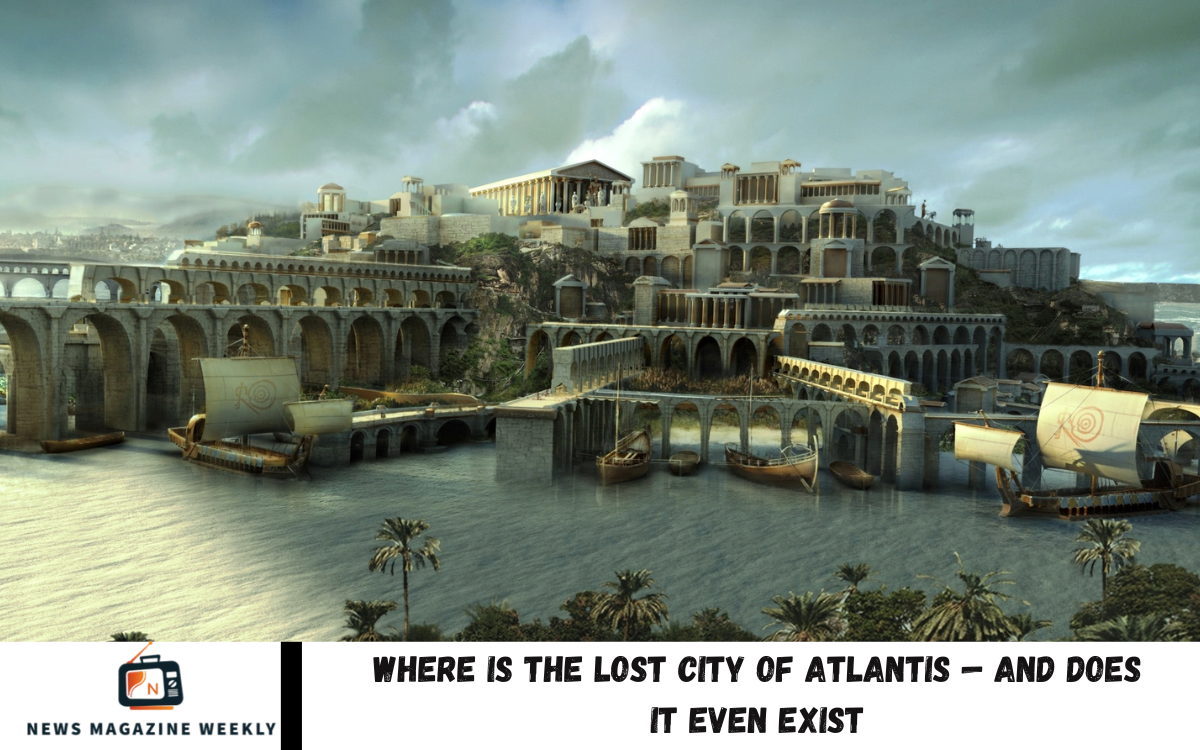The mystery of the Lost City of Atlantis has fascinated people for centuries. Plato, around 360 B.C., Civilization that sank into the ocean “in a single day and night of misfortune.” Since then, explorers, historians, and dreamers alike have searched for its location — with theories placing it everywhere from the Mediterranean to Antarctica.
But is Atlantis a real place lost to time, or simply a legend meant to teach a lesson? While no concrete evidence has been found, the story continues to spark curiosity and debate. Some believe it was based on an actual city destroyed by a natural disaster. In contrast, others argue it was entirely fictional, greed and pride.
Despite the lack of proof, the legend lives on in books, movies, and pop culture, capturing imaginations worldwide. Whether Atlantis was ever real or not, its story reminds us of the mysteries that still lie beneath the surface of history — and the ocean.
The Legend Begins: What Did Plato Say About Atlantis?
The story of Atlantis begins with the ancient Greek philosopher Plato, who wrote about it over 2,300 years ago. In his dialogues Timaeus and Critias, Plato described Atlantis as a mighty island nation that existed about 9,000 years before his time. According to him, Atlantis was located “beyond the Pillars of Hercules.
Plato portrayed Atlantis as a powerful and highly advanced civilization. The city was rich in resources and full of beautiful palaces, temples, and a complex system of canals. It was said to be a land of excellent knowledge, technology, and wealth — but also of growing arrogance and greed.
According to the story, the people of Atlantis became corrupt and tried to conquer other lands. As punishment for their pride and moral decay, the gods destroyed Atlantis in a single day and night of earthquakes and floods, sinking it into the sea forever.
A City Ahead of Its Time: The Description of Atlantis
Plato’s description of Atlantis paints a picture of a city far more advanced than any known civilization of its time. According to his writings, Atlantis was a vast and prosperous island, more significant than Libya and Asia combined. It was filled with rich natural resources, fertile plains, and an organized society that valued knowledge, power, and innovation.
At the heart of Atlantis stood a grand capital city designed with incredible precision and beauty. It was built in concentric circles of land and water — a unique structure that allowed easy transportation and strong defense. Bridges and canals connected the rings, and the city featured stunning temples, royal palaces, and a massive harbor bustling with trade.
Atlantis had an advanced infrastructure system, including aqueducts for fresh water, underground tunnels for transportation, and even hot and cold running water — features far beyond what existed in ancient times. Its society was said to be well-governed, with wise rulers and a legal system that promoted peace and prosperity.
Fact or Fiction: Was Atlantis a Real Place?
The question of whether Atlantis truly existed is one of history’s most enduring mysteries. While Plato gave a detailed account of the lost city, there is no solid archaeological evidence to prove it was real. This has divided scholars, scientists, and curious minds for centuries.
Some researchers believe Atlantis was based on a real place that was destroyed by a natural disaster — such as a volcanic eruption, earthquake, or tsunami. The Minoan civilization on the island of Santorini (ancient Thera), for example, is often cited as a possible inspiration. The Minoans were highly advanced for their time and mysteriously disappeared after a massive volcanic eruption around 1600 B.C.
Others argue that Atlantis was purely fictional—a story created by Plato to illustrate a moral lesson. In his writings, Atlantis symbolizes what happens when a powerful society becomes corrupt and greedy. According to this view, Plato never intended for it to be taken as literal history.
Read Also: Is the 50-Foot Congo Snake Fact or Fiction
Why Are We Still Obsessed with Atlantis?
Atlantis continues to capture the imagination of people around the world — and it’s easy to see why. It’s a story filled with mystery, treasure, advanced technology, and a dramatic fall from greatness. The idea of a lost, sunken city hidden beneath the ocean stirs something profound in our curiosity — a mix of adventure, hope, and the unknown.
Part of the obsession comes from the possibility that Atlantis might have been accurate. What if there’s a lost civilization still waiting to be discovered beneath the waves? That question has inspired countless books, movies, documentaries, and even underwater expeditions. It keeps the legend alive and fuels the dream of finding something extraordinary.
Atlantis also taps into something more significant: our fascination with ancient knowledge, forgotten history, and powerful warnings about human pride and greed. Whether seen as a myth, a moral lesson, or a real place, the story of Atlantis challenges us to think about our world — and what could happen if we don’t learn from the past.
Frequently Asked Questions
Could Atlantis be based on the Minoan civilization?
Yes, one popular theory links Atlantis to the Minoan civilization, which was advanced and suddenly destroyed by a volcanic eruption on the island of Santorini.
Why did Atlantis supposedly sink?
According to Plato, the gods punished Atlantis for becoming corrupt and greedy. It was destroyed by earthquakes and floods and vanished beneath the sea.
Has anyone ever found Atlantis?
Many people and explorers have claimed to find it, but none of the claims have been proven. The mystery continues to this day.
Why are we still so fascinated by Atlantis?
Because it mixes adventure, mystery, and the idea of a forgotten world, the possibility that such a place could exist keeps people curious and hopeful.
Will we ever find Atlantis?
It’s impossible to say for sure. Until strong evidence is discovered, Atlantis will remain a legend—one that reminds us of human potential and the power of nature.
Conclusion
The mystery of Atlantis continues to captivate people around the world, even after thousands of years. Whether it was a real place lost to history or simply a powerful story created by Plato, the legend lives on — inspiring explorers, writers, and dreamers alike. Despite countless theories and searches, no one has been able to prove that Atlantis truly existed. Still, the idea of a once-great civilization swallowed by the sea sparks our curiosity and fuels our imagination.

